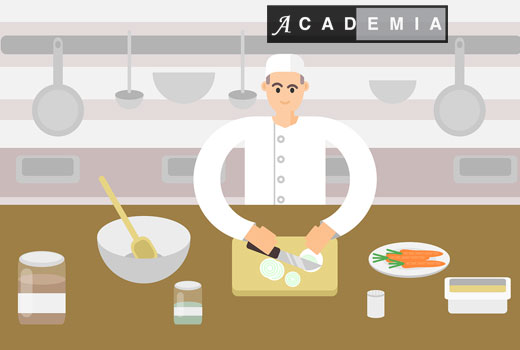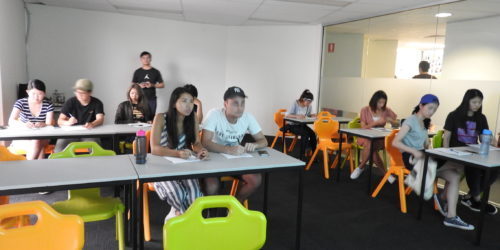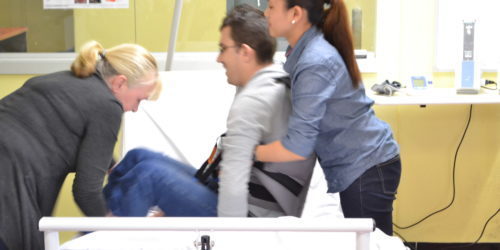Patisserie vs. commercial cookery courses in Melbourne

We Australians love our cafes and restaurants – nowhere is this more obvious than in Melbourne!
Just one question: what do you need to study to start a career in the highly-competitive hospitality and food service sector?
A commercial cookery course is one of the most common pathways – however, that isn’t the only option open to you. Our patisserie courses are another option that you can take.
Which one can get you where you want to go career-wise? We’re glad you asked – today, we’re going to run through some of the biggest differences between the two.
Hopefully, that’ll help you decide whether a commercial cookery or patisserie course is right for you!
Spot the difference: what makes a commercial cookery course different from study patisserie?
Skillset
While both commercial cookery and patisserie work happens inside the kitchen, that’s almost where the similarities end!
Since they both deal with different types of food, both require mastery of different skills.
While studying one will give you an introduction to some of the techniques used in the other, if you want to make it your career, you’ll need to specialise.
Say you decide to study commercial cookery in Melbourne – you’ll need to learn:
- Food preparation for meat, seafood, and vegetable and farinaceous dishes
- Different techniques such as knife skills
- A wider range of cooking techniques for a wider range of dishes
By contrast, patisserie chefs focus primarily on desserts, sweets, cakes and more. As part of your day-to-day, you’ll use different cooking equipment, different techniques and make different food.
As a master of bread and pastries, you’ll spend most of your time studying patisserie focused on developing skills like:
- Production of yeast-based bakery products
- Pastry-making
- Creation of petits fours
- Gateaux, torten and cake making
- Baking
- Decorating and carving cakes
While a commercial cookery course can provide some of the skills you need, you’re going to need to specialise if the goal is to make this your career!
Length
It isn’t just the content that matters when looking at which course you should enrol in – it’s also important that you look at the differences in training and practice between commercial cookery and patisserie courses.
In particular, you may want to look at the length.
To complete Certificate III in Commercial Cookery, you must complete 21 core units and 4 electives.
By contrast, to complete a Certificate III in Patisserie, you must finish 17 core units and 5 electives.
Think of it this way: a commercial cookery course is a generalist course, covering a wide range of different cooking skills, cuisines and types of food.
Complete a commercial cookery course in Melbourne, and you’ll have no trouble sliding right in at any hospitality venue.
Since there’s more ground to cover in a commercial cookery course, these courses tend to be longer.
By contrast, patisserie is specialised. You’re being brought on to make cakes, desserts, pastries and more.
This isn’t to say that patisserie is easier – just that you’ll be focusing on honing a much narrower range of skills, making our patisserie courses a little shorter in comparison.
Opportunities
Let’s be clear: both of these courses offer plenty of fantastic opportunities for students like you – they’re just different!
As a broader course, a commercial cookery course can land you in all sorts of different hospitality businesses. Restaurants, cafes, hotels, function centres, catering companies… you name it!
By contrast, if you want to build a career out of making mouth-watering sweets, pastries, cakes and desserts, you’ll need to study patisserie.
While a commercial cookery course can open many doors, one that it can’t open is opportunities to work in bakeries, dessert kitchens and other sweeter workplaces.
No, you’ll need to complete a patisserie course to enjoy these options.
Fortunately, there are plenty of these opportunities around Melbourne, so you don’t need to worry about a lack of opportunities if you choose a patisserie course in Melbourne over a commercial cookery one.
If these types of positions are your end-goal, there’s no doubt that a patisserie course is just what you need!
The food you’ll make
And finally, you’ll make different things depending on which of these courses you study!
Our commercial cookery courses are designed to cover a wide range of different cooking skills, all of which are transferable across workplace and cuisines.
Depending on where you wind up, you could find yourself making anything from pasta dishes, to steaks, to stir-fry, to curry, and everything in between!
Pastry chefs on the other hand, are specialists. They bake all types of pastries, cookies, cakes, muffins, bread, desserts and more.
Which one would prefer to make a career out of? Would you like to come out with a broad range of skills? Or are you someone with a massive sweet tooth who’s excited to start a career where you get to work with sweets and desserts all day?
It’s important to ask yourself what you’d prefer working with when deciding what direction to take your hospitality career in.
Academia’s commercial cookery and patisserie courses
Whether you want to study patisserie in Melbourne or take your commercial cookery career further, we’ve got a course for you
Whichever direction you decide to take your hospitality career, it’s crucial that you start by getting the right training.
Luckily for you, Academia offers a wide range of courses that allow you to kick-start your career, no matter what direction you plan on taking it.
And unlike TAFEs, where students are placed in the TAFEs own cafeteria to complete their work placement, all Academia Instatite’s Patisserie and Cookery students complete their work placement in Melbourne’s (and Brisbane’s) best hospitality establishments. Meet our industry partners here.
Additionally:
- For Victorian Skills First eligible students, tuition fees are FREE, and
- For Queensland Higher Skills eligible students, tuition fees are heavily reduced
Certificate 3 in Commercial Cookery (SIT30816)
This course combines classroom-based learning and practical training that will prepare you for the plentiful opportunities our hospitality sector has on offer.
You’ll complete a wide range of subjects that give you everything you need to kick-start your career whether you’re a recent year 12 graduate or making a career change.
Find out more about the Certificate 3 in Commercial Cookery.
Certificate 4 in Commercial Cookery (SIT40516)
Are you planning to start your own cafe or restaurant? Gunning for a promotion?
Learn everything that you need to know from the management, finance, and marketing side of hospitality that you need to succeed in leading a team or organisation.
Completing a Certificate 4 in Commercial Cookery can open up a pathway towards earning a Diploma of Hospitality Management as well.
Find out more about the Certificate IV in Commercial Cookery.
Certificate 3 in Patisserie (SIT31016)
Certificate III in Patisserie prepares you to produce sumptuous desserts and pastries, all while applying hygienic practices for food safety and working effectively as part of a larger hospitality team.
You need to take this course to advance to the Certificate IV in Patisserie.
Learn more about the Certificate III in Patisserie.
Certificate 4 in Patisserie (SIT40716)
Lead and manage a team when you work in hotels, restaurants and even in your own business with Academia’s Certificate IV in Patisserie.
In addition to preparing you to get involved in commercial cooking operations and implementing and monitoring work health and safety practices, this course also teaches you how to make more advanced cakes and desserts as well!
Learn more about the Certificate 4 in Patisserie.
Have questions about our online commercial cookery and patisserie courses in Melbourne?
Contact our team to learn more about our hospitality courses – we’re here to assist you!
- Fill in this enquiry form
- Call our Melbourne campus on (03) 9671 4755
- Email us at info@academia21.com





